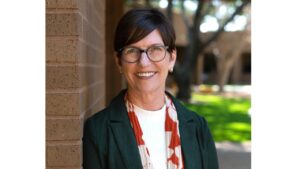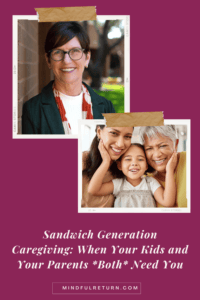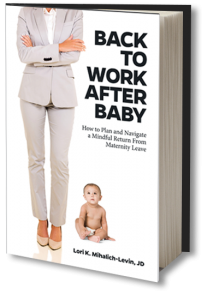 Are you a member of the so-called sandwich generation? (Or, more aptly sometimes, squished like a panini?!) If you have a parent who is 65+ and you also are caring for a child under 18 (or providing financial support to a child over 18), the answer is yes. My husband and I are squarely in this cohort. And while a few years ago, most of our conversations and activities revolved around diapers and daycare, now more and more of them involve the needs of our older family members.
Are you a member of the so-called sandwich generation? (Or, more aptly sometimes, squished like a panini?!) If you have a parent who is 65+ and you also are caring for a child under 18 (or providing financial support to a child over 18), the answer is yes. My husband and I are squarely in this cohort. And while a few years ago, most of our conversations and activities revolved around diapers and daycare, now more and more of them involve the needs of our older family members.
As you know in your bones if you’re living it, working parents in the sandwich generation face added pressures that affect our ability to navigate work-life stresses. And more and more workplaces are starting to become aware of these generational challenges.
Today, I’ve invited to the blog Dr. Wendy Whittington, the Chief Care Officer at Cariloop, who lives and breathes sandwich generation caregiving, not only in her personal life, but in the issues she works on in her day job, too. Here’s Wendy to share with us some of the history of this “sandwich” phenomenon and also ways we can cope in the process of doing all this caregiving.
************************************
You’re a working parent taking care of your children. You’re also caring for your own aging parents, either up close or from far away. Your schedule is constantly booked and changing. New appointments for your loved ones are added to the list every day. You’re considering taking a leave from work, but you’re not sure if it’s possible. You’re busy, and you don’t get much time for yourself. If any of this sounds familiar, you’re officially part of the sandwich generation.
In 1981, a social worker named Dorothy Miller invented the phrase “sandwich generation” to describe women who were the primary caregiver of their aging parents and young children. Now, the sandwich generation refers to a population of individuals who are responsible for the care and support of two generations: their aging parents or elderly relatives and their own children. They’re caregivers, giving time for their loved ones’ care coordination, appointments and so much more.
Unfortunately, the stress and anxiety caregivers feel when caring for loved ones can be overwhelming. Here’s what the research shows:
- 66% of sandwich generation caregivers feel “very stressed” or “somewhat stressed” about affording their financial obligations over the next 10 years.
- 84% of caregivers whose parents need daily help say their parents also rely on them for emotional support at least some of the time.
- Populations in the U.S. and Canada are projected to only get older with time. This means more people are entering the sandwich generation, and those in the sandwich generation will be caring for an increasing number of adults over 65.
How to Balance (or Perhaps Just Manage) It All
So how do you make sure your career, your loved ones and your own needs are getting the attention they deserve? Here are a few key ways our Care Coaches at Cariloop recommend:
- Plan Out a Schedule that Works: When you’re juggling so many priorities and needs from different loved ones, keeping your calendar straight can help limit the chaos. Create a plan for your day, week or month that includes time for your caregiving duties and for taking care of your own needs. Write down when you’ll help your parents or other older family members, your child or children, and yourself. Know that it’s okay to have things shift or change.
- Ask for Help: No one should go through caregiving alone. Reach out to family members, friends or neighbors who can help look after your kids one or two days, or cut your grass every week. Accepting and asking for help isn’t a form of defeat. Instead, it’s an acknowledgment of your humanity. Additionally, explore options within your employer’s benefits offering. What programs or services catered to caregiving or working parents do you have access to? Utilize what you already have at your fingertips. It’s never too late to reach out for help.
- Practice Self-Care: This is a drum we will beat forever – take time to care for yourself. Those caring for their loved ones are more likely to have health problems, higher stress and increased mental health needs. Self-care isn’t a luxury, it’s essential. When you take care of your own needs, it actually leads to better care for your loved ones. You’ll also have more energy to balance work and home life. Self-care can be:
- A walk
- Reading a new book
- Time alone, even five minutes
- Scheduling your yearly medical appointments
- Spending time with friends
- Learn Often: The good news is that you’re not the first person to be a caregiver in the sandwich generation. There are resources available to support caregivers in your situation. If you’re considering taking a leave of absence, ask your employer about options and opportunities before you go. Look into local support groups, online forums or community organizations that offer assistance. Additionally, your company might have benefits for caregivers or working parents. Be sure to explore if there are resources like this available.
Members of the sandwich generation take on a uniquely demanding role every day. When you’re balancing a career with caring for multiple loved ones, it can easily get overwhelming. Remember that seeking help and accessing resources are not signs of weakness, but acts of strength.
Whether you are a sandwich generation caregiver, know someone who is or may become one in the future, it’s important to remember there is no easy “cure-all” to caregiving stress. Some days it can be a bit harder to manage than others, but with a mindful and holistic approach to balancing your responsibilities and priorities, caregiving transforms from a demanding responsibility to a balanced and often very rewarding part of a busy schedule.
 Dr. Wendy Whittington, MD, MMM, has spent 30+ years in healthcare in clinical, administrative and consulting roles. She first served as a board member for Cariloop in 2018 before becoming Chief Care Officer, where she currently oversees coaching operations. Wendy is a board-certified pediatrician and has held various positions in the acute care and industry settings including CMIO, CIO and CMO. She brings her broad healthcare, information technology and teaching background to Cariloop. Wendy has a Masters of Medical Management from Carnegie Mellon University and her MD from Rutgers New Jersey Medical School. She enjoys cooking, reading literature and learning about languages and cultures.
Dr. Wendy Whittington, MD, MMM, has spent 30+ years in healthcare in clinical, administrative and consulting roles. She first served as a board member for Cariloop in 2018 before becoming Chief Care Officer, where she currently oversees coaching operations. Wendy is a board-certified pediatrician and has held various positions in the acute care and industry settings including CMIO, CIO and CMO. She brings her broad healthcare, information technology and teaching background to Cariloop. Wendy has a Masters of Medical Management from Carnegie Mellon University and her MD from Rutgers New Jersey Medical School. She enjoys cooking, reading literature and learning about languages and cultures.
Want more practical tips on working parenthood? Check out my book, Back to Work After Baby: How to Plan and Navigate a Mindful Return from Maternity Leave



